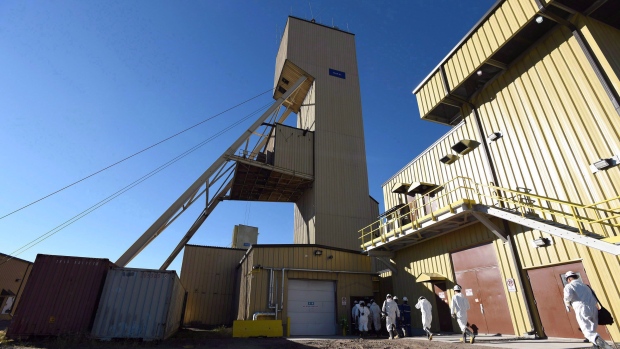Sep 27, 2018
Cameco shares jump after winning CRA tax dispute
The Canadian Press

Shares in Cameco Corp. shot higher Thursday after the company said the Tax Court has ruled in its favour in part of a dispute with the Canada Revenue Agency where billions of dollars are at stake.
The case centres around Cameco's use of a subsidiary in Switzerland to sell and trade its uranium. The CRA contends it was a sham established to avoid Canadian taxes, while Cameco has maintained it was for legal and sound business practices.
Cameco chief executive Tim Gitzel called the judgement issued Wednesday was a clear victory.
"It was a clear and decisive ruling in our favour. Our company has been through a lot over the last several years, so this is a great day for Cameco," he told a conference call with financial analysts.
The company's shares closed up $2.01 or 15.7 per cent at $14.80 on the Toronto Stock Exchange after spiking to as high as $15.62 in the morning.
The ruling only covers the company's 2003, 2005 and 2006 tax years where about $11 million in taxes is at stake, but will have implications for subsequent years where some $2 billion in taxes plus interest and penalties are in question, Gitzel said.
"We believe the thorough and meticulous analysis of the facts in the judgement will make it difficult to overturn, and furthermore will be relevant in determining the outcome for subsequent years."
The CRA will "carefully review the decision and will respond in due course," a spokesman said by email, noting the agency has until Oct. 26 to appeal the decision to the Federal Court of Appeal.
Cameco set up its Swiss subsidiary in 1999 and established a 17-year deal selling uranium at approximately US$10 a pound, which is what it was roughly trading for at around the time.
The spot price, however, spiked to over US$130 a pound in 2007 and in recent years has ranged between about US$18 and $40, while the Swiss subsidiary was still paying the fixed price.
Had the uranium price dropped below US$10 a pound, the Canadian company would have made a profit that's taxable in Canada by selling it at the fixed price, but instead the Swiss firm has been banking the profits and paying Swiss rates.
Judge John Owen ruled the arrangement was not a sham and provided more clarity for companies setting up international entities to spread risk, said David Hogan, a partner at financial consultancy Richter LLP.
"The big message here is if you do transfer pricing right, there's good opportunities for risk sharing in an international context, and the results can be both favourable and unfavourable from a tax position."
The ruling clarifies that the CRA has to rely on the same information a company has when setting up such entities, Hogan said.
"When you're entering into speculative contracts, the information that you have on hand at the time is relevant, and Canada Revenue is held to that same standard, so it's not using the benefit of hindsight."
He said that from a practical standpoint, the ruling is a good indication of how subsequent years will be assessed.
Diana Gibsons, communication and research manager at Canadians for Tax Fairness, said the ruling shows Canada laws are too weak on the issue of when a tax-friendly foreign subsidiary is justified.
"This does speak to our call that we've been consistently making, that we have a need for law reform in Canada to actually put in an economic substance law that's enforceable."
Cameco said the court has referred the matter back to the Minister of National Revenue in order to issue new reassessments for the years in accordance with the decision.
The company will be making an application to the court to recover the costs incurred over the course of this case that total about $57 million, Gitzel said.


